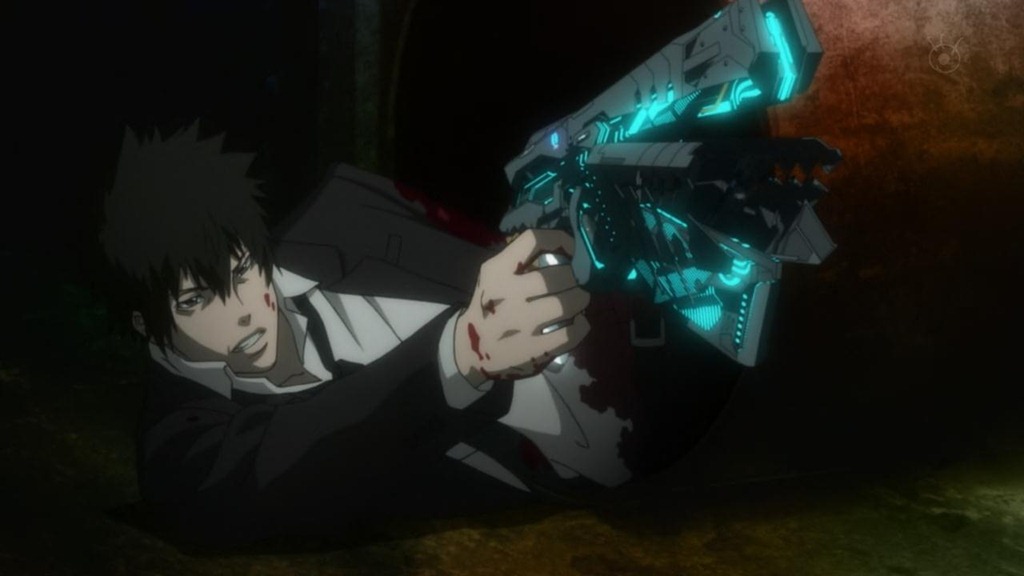 As author Cory Doctorow has said time and again, science fiction can only predict the present. That’s exactly what makes Psycho Pass so great.
As author Cory Doctorow has said time and again, science fiction can only predict the present. That’s exactly what makes Psycho Pass so great.
Psycho Pass ostensibly takes place one hundred years from now. But through its increasingly unforgiving lens, we see our modern issues merely magnified. As machines take over people’s lives, they solve some problems of comfort and convenience, but make far bigger ones that may even put human rights at stake.
Portrayed in a stark palette of cool colors and smooth surfaces, this gritty cyberpunk mystery leaves us with more questions than answers. One of the biggest being, can we truly identify and prevent criminal inclinations before a crime is ever committed?
This scenario has a lot in common with Philip K. Dick’s short story turned blockbuster, Minority Report, in which a policeman has an ordinary life arresting pre-criminals… until he discovers the machine in charge of identifying murderers has named him as the next.
I don’t think I’ve mentioned it, but Philip K. Dick is my favorite author. Though clouded by his occasional misogyny, he understands human nature like nobody’s business. And, as with all the best science fiction, his stories tell us more about the times he lived in (the mid-20th century) than some nonexistent future.
Dick is regarded as a genre writer in America (though scholars’ leanings are changing in recent years), but his books have been bestsellers in Japan since the 70s. It may owe no little credit to the fact that many of Dick’s postwar works feature Japanese protagonists in positions of power, as a reverse future where the Axis beat the Allies was one of Dick’s favorite themes.
So you could say I had a fangirl moment when the series’ villain, Shogu Makishima, encourages a crony to read Dick’s Do Androids Dream Of Electric Sheep? Makishima says he sees the town, ruled absolutely by the Sibyl System, as a parody of the novel. Do Androids begs the question of what it means to be human. Makishima is a man both frustrated and freed by his inability to be recognized as a normal human by the Sibyl System. And this sense of alienation, paired with his intelligence, makes for a truly formidable antagonist.
It’s no wonder anime academic Charles Dunbar called Psycho Pass the show that made him love anime again. Forget the pandering and panty shots. Psycho Pass is truly an anime for the intellectual mind, forcing us to contemplate sometimes uncomfortable truths about our time.
This post is the fifth installment of The Twelve Days Of Anime, a blogging series in which anime fans write about shows that inspired or impressed on them this year.
Discover more from Otaku Journalist
Subscribe to get the latest posts sent to your email.





7 Comments.
Okay, I’m going to watch this one as soon as I finish up Clannad: After Story and crying my eyes out. Some action and the concept sound wonderful. I like Dick’s work as well, so really looking forward to this series. Thanks for letting me know about it. Never made it onto my radar screen for some reason.
Update: Watched the first four episodes last night, staying up way too late, and I’m hooked, even already recommending it to a couple of friends.
I like the story of Psycho Pass. I’m just a little irritated with the heroine. She seems weak. Her high tolerance of being clouded is what only makes her special.
@monmonkun, I agree that Akane wasn’t a very engaging character – at first. She was the viewer avatar there to ask the dumb questions so we would know what’s going on. But later, when she makes her own decision to work with the Sibyl System, I realized she’d come into her own.
Anime inspired by, and referencing, Phillip K. Dick? This sounds right up my street. I want to watch it right now, but have to wait for the blu-ray release next month!
[…] Dec. 18 — Psycho Pass is a Dickian dystopia […]
[…] Reference: http://otakujournalist.com/psycho-pass-is-a-dickian-dystopia […]